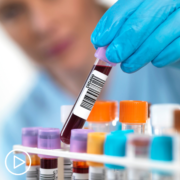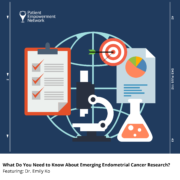Understanding Prostate Cancer Treatment Options and Care Goals
Understanding Prostate Cancer Treatment Options and Care Goals from Patient Empowerment Network on Vimeo.
How do prostate cancer treatment options and goals vary from patient to patient? Expert Dr. Rana McKay discusses standard approaches to treating advanced prostate cancer and factors that may impact care decisions.
Dr. Rana McKay is an associate clinical professor of medicine at Moores Cancer Center at UC San Diego Health. Learn more about Dr. McKay.
See More from Evolve Prostate Cancer
Related Resources:

Overcoming Barriers | Advice for Accessing Prostate Cancer Clinical Trials |

|

When Should Prostate Cancer Patients Consider a Clinical Trial? |
Transcript:
Katherine:
So, before we move onto understanding current treatment options, Dr. McKay, what are the goals of advanced prostate cancer treatment? And how do they vary by patient?
Dr. McKay:
Yeah. I do think the goals can vary. I think in my mind, a lot of times, it’s making people live longer, making them feel better. Those are the two salient goals and if our therapies are not achieving one or other of those two goals then we need to rethink the strategy. But different people are different, and they may weigh the risks and benefits of any given therapy, or the slated benefit with the slated risk through a different lens. And I think it’s critically important to ensure that you’re having those communications with your doctor about the things that matter to you and the things that are really important to you.
Especially, for people who have advanced prostate cancer. So, I think that can help your clinician strategize, “Okay, is this an individual who wants the kitchen sink everything that I can do even if that means more toxicity that I’m going to offer this thing? Or is this a situation where, you know what, unless there’s data that the kitchen sink is going to work, I really kind of want to temper things and try an approach that’s going to be effective, but maybe not associated with that degree of toxicity.” So, those kinds of conversations absolutely need to be happening.
Katherine:
With all the recent advances in treatment, is there a standard approach now to treating someone with advanced disease? And if so, what is it?
Dr. McKay:
Yeah. There absolutely is a standard approach. There’s guidelines that are based off of the FDA-approved regimens of the different agents that can be utilized. There’s data regarding sequencing though, I think there’s more data that needs to be had on sequencing. There are guidelines on when to do germline testing, when to do tumor profiling, when to integrate PSMA PET imaging, the standard hormonal agents, who to use them. So, I do think that there are – there’s a set framework of appropriate management and treatment. But there’s a lot of personalization that is overlaid on top of that rubric. And I think that’s the art of medicine.
Katherine:
Right. Is there testing to understand if a patient’s disease is more aggressive? Or maybe will respond to a certain type of therapy before you begin it?
Dr. McKay:
Yeah. A very good question. And I think predictive biomarkers, as you described them, there are several for men with prostate cancer, but there’s not a ton of them. So, we know that homologous recombination repair alterations, HRR, gene alterations, particularly BRCA 1, 2, probably 2, we know that those are biomarkers of response to PARP inhibitors. We know that patients who have high tumor mutation burden, or have a mismatch repair, that those are markers of response to immunotherapy. We know that if people have a certain level of PSMA PET vividity on their PET scan, that that’s a biomarker for receiving lutetium PSMA.
Those are the main biomarkers that are actually in use in the clinic to date. But I think there’s a lot more that I think are being explored from mutations in the androgen receptor, or amplifications in the androgen receptor, being potentially predictors of response to different degraders, different kind of hormonal agents. There’s certain tumor suppressor gene mutations that may predict that patients may do a little bit better with chemotherapy. So, there’s other markers that are being looked at, but they don’t have the same robustness as the BRCA 1, 2, and other ones that I talked about.
Katherine:
Yeah. How does a patient’s health and lifestyle impact what treatment approach is right for them?
Dr. McKay:
I mean, health and lifestyle, diet, and exercise, nutrition, sleep are so important. I think that one of the backbones of treatment for hormonal therapy is androgen deprivation therapy. There can be negative consequences with regards to muscle mass, bone mass, other things related to that therapy. So, I think it’s critically important for patients to maintain a healthy diet, making sure they’re getting appropriate exercise, weight-bearing, resistance training.
And I think, too, this helps people with their functionality, with their ability, their reserve, and ability to tolerate treatment or tolerate more aggressive treatment. So, half of my clinic is talking about diet and exercise, and how to optimize individual health when people are on therapy.
Katherine:
Yeah. Mentally, a good diet and sleep –
Dr. McKay:
Yes.
Katherine:
And exercise is going to be helpful.
Dr. McKay:
Yes.
Katherine:
As well. What about comorbidities? Do they play a role?
Dr. McKay:
They absolutely do play a role. I think comorbidities like cardiovascular disease, diabetes absolutely can play a role. The hormone therapies, patients can have a propensity to gain weight, they can have a propensity to have worsened cholesterol being on hormone therapy, which can then affect somebody’s cardiovascular health. And so, some of the drugs cause increased hypertension. So, I think understanding the different comorbidities that any individual may have is important in selecting the best therapy, “Well, actually, if you’ve got X, Y, Z going on, maybe I’m going to shy away from this, but lean more towards that.”
I think making sure that your physician knows about that and knows about changes that happen along the way. Sometimes, people with prostate cancer, many a times they have a long, natural history where they’re seeing the physician caring for them for their prostate cancer over many, many years.
And somebody’s medical history, when they first saw that individual, it’s going to change and evolve over time as different things happen. And so, I think keeping your clinician that’s caring for you for your prostate cancer informed of all the other non-cancer things that are happening I think is a really good idea.
If you had a fracture, that’s actually a really important thing for somebody who’s got prostate cancer. Or “Gosh, my primary care just started me on Metformin because they think my blood sugar is a little bit off.” These are important things, I think, for clinicians to know about.
Katherine:
Yeah. It’s all about communication, isn’t it?
Dr. McKay:
Absolutely. Yeah.
Katherine:
Don’t worry about over-sharing.
Dr. McKay:
Yeah.










